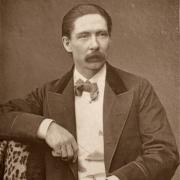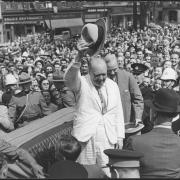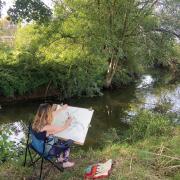Do you know what… It’s such a treat to see Pam and Dudley. Haven’t seen them for simply ages. You know - Pam Ayres: one of the best-selling poets of all time. (Second only to Ted Hughes.) (Yes, please do read that several times and NB.) And Dudley Russell, her husband of some four decades (theatre producer; concert promoter for the biggest of stars).
And Izzy, the Jack Russell…
(Look. In the interests of fairness, I’m trying to find an equally suitable epithet to fill these brackets. But, delightful as she is, the brutal truth is that Izzy only has one trick – a barrel-roll – which she fluffed last time I saw her. She and I have agreed never to speak of this again.)
It’s lovely, their Georgian home that sits in a village outside Cirencester. Quite different from the 20-acre smallholding the Russells used to have, filled with animals such as Myrtle, the demanding Cotswold sheep (who once inexplicably turned her nose up at a ram blessed with the looks of Mr Darcy). (What was she thinking?). And Wingit, the happiest one-winged chicken ever to have semi-escaped a fox’s clutches.
But this place, too, is filled with creatures. Pheasants that peck in the walled garden; birds in the cedar tree: tiny goldcrests, blush-faced tits, long-beaked treecreepers amongst them. A hole in the wall provides a hedgehog super-highway: an easy zip from surrounding fields for a garden-gorge on fat beetles, motorway-services-style.

‘Now these,’ Pam says, as we pass an arrangement she’s put together for the hall, ‘are from tubers Dudley’s sister gave me because I like these sugar-pink dahlias. My niece, Stella, gave me some zinnia plants [deepest of red]. These are some antirrhinums I planted; and some ammi because that’s a good filler.’
Every spirit-lifting arrangement she posts on X/Twitter gets tons of attention – 4.3k likes, and 10 times that many views on the latest.
'Honestly', she posts underneath, 'anybody could do it'.
(Err. Definitely not me. I even have to look up how to spell them.)
‘But the reactions surprise and delight me,’ Pam says, gratified.
Well, why wouldn’t we love seeing pictures of beautiful flowers. As Iris Murdoch observed, one of the secrets of a happy life is continuous small treats… And I’d add to that: a happy life is also full of minor, shared grumbles. Particularly grumbles expressed in succinct phrases and bouncy meter.
Such as:
The infallible husband who thinks he has answers to each and every issue that baffles the rest of the known world:
'Yes, they should have asked my husband, he can sort out any mess,
He can rejuvenate the railways, he can cure the NHS.'
Or the deep regrets of put-it-off dentistry:
'All the toffees I chewed,
And the sweet sticky food,
Oh, I wish I’d looked after me teeth.'
All life’s sadnesses are there, too. Few more gut-wrenching than that final visit to the vet:
'Now as my key turns in the lock the sound I miss the most of all
Are the tippy tappy toenails as they skidded down the hall.'
Pam Ayres: brilliant wordsmith, laugh-out-loud comic, best-selling poet.
And someone who, quite simply, understands.

So how about we begin with Doggedly Onward – A Life in Poems: out this month, on National Poetry Day.
‘I’ve weeded out a few that grate over time, but this is the complete works.’
Goodness! *Tries to calculate the number of poems Pam has written over six decades* *Fails* *Gives in and asks*
How many in total?
‘Oh, blimmin’ heck. I don’t know.’
‘There are 400-odd pages; a vast tome,’ Dudley interjects, on his way to his garden-office.
‘You may need a winch to lift it. It’s a big book… I can’t believe I wrote so much.’
It’s a history, too. Not only of a world that has changed beyond recognition; but of Pam’s own life. Of faithless boyfriends who run off with somebody else. Of late-night knitting. Of getting married. Of bringing up two sons, now grown with families of their own.
‘There’s one called The Voice at the Foot of the Stairs, which was about trying to get the children up in the morning. They didn’t get up, and they didn’t get up… and there wasn’t time for them to have a proper breakfast.
‘Then there’s a bit about: Don’t stand on the back of your shoe – they stand on the back and crush it. And when you finally get them out of the door because the bus has come, they’ve gone without their lunch. And it needn’t have happened if they’d got up half an hour earlier!’
(Tell me about it.)
Did the boys ever rebel against poetic guest appearances?
‘I always checked with them – always. I’d say, ‘I’m going to put this poem out, but tell me if you don’t like it and I’ll scrap it’.’
She laughs. ‘They’d say, I don’t care… [Intoned à la Kevin the Teenager.] But don’t write that as if it sounds unkind! It was just that the daft stuff mother was writing didn’t impinge on their lives.’
Daft stuff?
Hmm. Let’s examine that, for a moment.
I get that there’s a distinction between scholarly and friendly poetry. I get that there’s a difference between wandering lonely as a cloud, and seeing a cloud but forgetting your umbrella.
And yet…
There is not just wit but wisdom, too, in the lyrical, succinct, incredibly clever lines that Pam Ayres writes.
‘I suppose the way I think about life comes through. I’ve written about things that leapt out at me – not being able to get contact lenses in your eyes; or your dog’s died; or your child’s gone off to university. Things that matter. Things I feel other people will identify with.
‘I spend ages on a line to get that flourish at the end. I love tinkering with words; it’s no chore. When you find just the right word with just the right meaning and just the right shape. Oh, it’s joyful!’
Performing, too. To a packed Sydney Opera House (twice); at Glastonbury (twice); in front of much-missed HM Queen Elizabeth (three times).
‘Sometimes people read my poems out and it sounds all wrong! I could throttle ‘em. I could get ‘em by the throat and say: Leave it alone! Because they just don’t get the rhythm - and the rhythm is so important…
‘I’m going to sound like a violent woman, aren’t I!’

‘I wouldn’t say it was poverty-stricken in the way you might think about Billy Connolly and his description of the Gorbals. But we didn’t have much. Nobody had anything. When somebody had a baby, the bundle of baby clothes was passed from one family to the other.’
Never a shortage of food, though, thanks to her dad, who not only supplied the family with his home-grown veg, but swathes of the village, too.
‘He’d come home from his job as a linesman for the Southern Electricity Board, where they had to go traipsing all over ploughed fields; shinning up electric poles and dealing with all the gubbins at the top. He’d put his old hoe and rake and that on the crossbar of his bike, go down and do his garden, and bring home great tin baths - you know those oval baths – of broad beans and peas and all manner of lovely food for us.’
Never mind poetry: there was no money for books full-stop at home. But Pam pin-points a moment – maybe on the radio; she can’t remember – when a poem first socked her straight between the eyeballs.
‘I was about 12, and I heard a song of Spike Milligan’s called the Wormwood Scrubs Tango, to this really staccato rhythm.’
She recites it, pretty much word-perfect even now.
‘It was a revelation. That was the moment I discovered how funny a poem could be.’
Pam’s journey to fame - performances round folk clubs; her life-changing appearance on Opportunity Knocks - all is the stuff of legend. We’ve spoken about it many times.
Yet today we talk about something different; a deeply unhappy period that followed her catapult into the limelight. Something we’ve never touched on before. (And I’m really interested. After all, we’ve just mentioned wisdom; and wisdom never comes from pure success.)
It was early on; not long after that initial burst of fame, when Pam was persuaded – against her better judgement – to do a series for London Weekend TV: 13 weeks of 45-minute-long programmes
‘I was paid a substantial sum of money. Suddenly, before I was even 30, I could afford to buy a house. I could afford to buy an MGB GT, the car of my absolute dreams. Things I would never ever have imagined I could do.
‘My mum said, ‘You’ve made it!’ And financially I had.’
But no happiness?
‘No.’
The problem was, there was no way she would have time to write enough material to fill a whole TV series. She could see this from the off.
‘They said, ‘Oh, don’t worry; we’ll bring people in to write in your style’.’
It was a catastrophe.
‘From being well liked and considered funny and different, I was put in this terrible environment where I was starring in this naff show on telly every week, and people hated it; and quite rightly. I got pilloried.’
Even though the calibre of the writers was pretty classy?
‘But I minded people trying to write in my style. I minded very much - and it wasn’t in my style. The only person who writes in my style is me.’
One of those commissioned was Spike Mullins, creator, amongst other things, of Ronnie Corbett’s armchair monologues.
‘Do you know what he said to me? He said, ‘You’re still at the stage when you enjoy writing. We, who do it for a living, we hate it’.
‘And I thought: God forbid I ever feel like that.’
Which she never has?
‘Never. I’ve always loved it.’
So how did she resurrect her reputation?
‘Dudley came on the scene.’

Dudley, the man who helped Pam rebuild her career (as well as becoming her husband, in the way of all true happy endings), is beavering away in his office. Life is incredibly full. A few nights ago, they were in Barnes, watching the first-ever performance of the musical Who Are You Calling Vermin? (based on Pam’s book of the same name), which she’s written with George Fenton.
Amongst much else, he composed the wonderful music for Blue Planet. ‘The music George wrote to my lyrics was so thrilling to me. I loved it,’ enthuses Pam. “It’s easy to see why he is festooned with BAFTAs.’
By the end of the performance, the Barnes audience were up on their feet, applauding.
It wasn’t only a dream realised - being part of a creative team of professional singers and musicians - it also is a way of putting across a key message. ‘I’ve always hated the term ‘vermin’ because it condemns a whole swathe of our native creatures to be considered worthless. A lot of them are despised because they interfere with blood sports.
‘So in this revue, there are animals expressing their point of view, alongside small farmers who’ve lost their funding; and fishermen who can’t afford to live in their communities because the houses are all buy-to-lets or holiday homes.
‘They’ve each of them got a song.’
There’s a similar message in the series of illustrated ‘I am’ children’s books she’s in the process of writing for Macmillan (Oliver the Otter; Hattie the Hare; Emily the Owl and – next year – Dandy the Dormouse): ‘The publishers asked me to write books in simple verse about our animals in their native habitat. No rubbish about animals going shopping and living in a mushroom; they were to be absolutely factual but appealing to children – and that was great. I loved doing it.’
Writing, yes; but Pam Ayres is also putting her money where her mouth is: in the form of 22 acres she purchased near Fairford (‘most of me lifesavings’), now transformed into a haven where all wild creatures are welcome. ‘We’ve put up two barn-owl boxes; one little-owl box. We’ve dug a big pond, which this spring was full of toads - a lot of hanky-panky going on in there.
‘It is magical. You provide the homes and these creatures move in.’
I tickle Izzy’s tummy, and glance out of the window: to the wild-things garden where the flowers are blooming and the birds are having an absolute ball.
‘I try to protect wildlife because I miss it,’ Pam Ayres says. ‘I miss it. When I was growing up in Stanford in the Vale, we were surrounded by life.’
There, on the village green, grasshoppers would land on her hand. Along the brook, she’d watch water voles, minnows and sticklebacks; caddisfly tubes woven from grains of sand.

‘It’s nearly all gone and it breaks my heart. It breaks my heart that we’ve let it go.’
Things that matter. Things other people will identify with.
Things Pam Ayres writes about, entertainingly in verse, with a message – as always – imbued with her own brand of wisdom.
Pam Ayres will be in conversation with Mark Cummings on Wednesday, October 9 as part of Cheltenham Literature Festival: cheltenhamfestivals.org
For more on Pam’s poetry, books, and forthcoming tour dates (including Chipping Norton Theatre on October 16), visit pamayres.com
Pam Ayres' new book Doggedly Onward - The Collected Poems

Pam Ayres has spent a lifetime providing hilarious and profound insights into the delights and tribulations of everyday life. As a young woman in the seminal decade of 1960’s Great Britain, she doggedly pursued a career as a performer and writer, stepping far outside of what was expected of her. In so doing she created a life for herself of which she could only have dreamed, travelling the world and bringing roars of laughter wherever she went.
Now, Pam has gathered her career’s work of poetry, spanning six decades, into this beautifully illustrated collection. In this book, Pam reflects on her writing, and traces the course of her life from the young woman juggling various boyfriends, to the wife adrift amid the joy and terror of new motherhood, to her current position of astounded, adoring granny.
Included are the cavalcade of much-loved dogs, her lifelong fascination with wildlife, the travel, mistakes, regrets, the heartbreak of leaving the family home, and the sober business of ageing. Meanwhile, she still continues to explore new avenues, such as writing lyrics for musical theatre. This collection is not just a testament to Pam’s remarkable legacy, but is a celebration of the human spirit, capturing the tears, laughter, joy, and wisdom from a remarkable woman whose work has provoked laughter and tears in people around the world.
The portrait on the front of Doggedly Onward is by artist Alex Chamberlin, who is currently preparing an exhibition of ex-military people now known outside their military careers. Pam was in the WRAF. (alexchamberlain.co.uk)



























